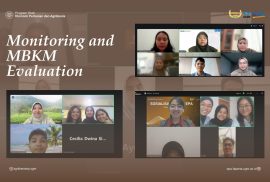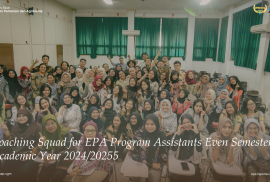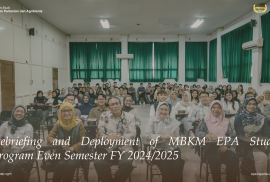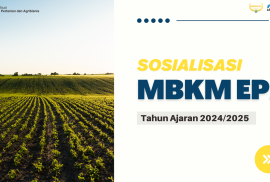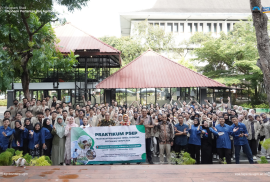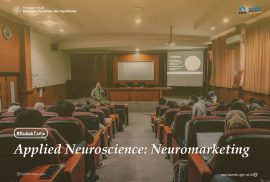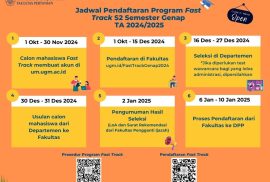Yogyakarta, April 10th, 2025 – The UGM Agricultural Economics and Agribusiness (EPA) Study Program again held Phase II Monitoring and Evaluation (Monev) activities for students participating in the Merdeka Learning Campus Merdeka (MBKM) Internship scheme. The activity on Thursday, April 10, 2025, online through the Zoom Meeting started at 13.00 WIB and was attended by MBKM participating students, MBKM supervisors, and representatives from internship partners spread across various agencies and companies.
SDGs 4 : quality education
Yogyakarta, February 11, 2025 – The Agricultural Economics and Agribusiness (EPA) Study Program of Universitas Gadjah Mada carried out Practicum Assistant Coaching Squad activities at the Sosek Building, Faculty of Agriculture. This activity aims to provide debriefing for 71 practicum assistants in charge of 9 practicum courses for the EPA Study Program in the even semester of the 2024/2025 academic year.
The event was led by Asih Kusumaningsih, S.P., M.Sc., as the Practicum Coordinator of the EPA Program for the Even Semester 2024/2025. In this coaching session, practicum assistants were provided with various necessary materials that support the smooth implementation of the practicum, starting from the introduction of the EPA Study Program practicum, the formation of assistant structures, and an explanation of the flow of practicum implementation.
Yogyakarta, February 7, 2025 – The Department of Agricultural Social Economics (Sosek) of Gadjah Mada University carried out the Debriefing and Deployment of Independent Students Learning Campus Merdeka (MBKM) for students of the Agricultural Economics and Agribusiness (EPA) Study Program and Agricultural Extension and Communication (PKP) class of 2022. The event, which took place at the Sosek Building, Faculty of Agriculture, aims to equip students with essential knowledge and skills before they go directly into the world of work through the MBKM program.
Yogyakarta, January 8, 2025 – The Agricultural Economics and Agribusiness Study Program, Universitas Gadjah Mada (UGM), carried out the Socialization of the Merdeka Belajar Kampus Merdeka (MBKM) Program for Ekonomi Pertanian dan Agribisnis (EPA) Study Program students class of 2022. This activity was conducted online through a Zoom Meeting attended by EPA Study Program lecturers and 2022 EPA Study Program students. The socialization aims to provide direction and information regarding the implementation of MBKM in the even semester of the 2024/2025 academic year. Some things discussed were the introduction of various MBKM programs offered and can be selected by students, the flow and conditions of MBKM implementation, especially for the type of MBKM Program Partners of EPA Study Program, then ended with a question and answer session by enthusiastic participants. The dynamic discussion reflected the great interest of students in this program.
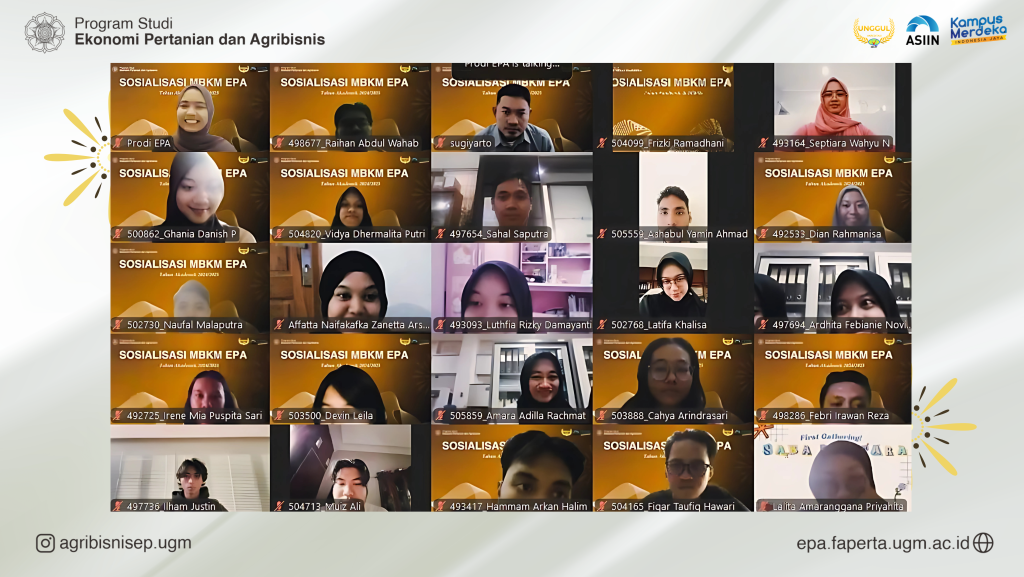
Students of the 2022 Agricultural Economics and Agribusiness Study Program conducted an Agricultural Socio-Economic Assessment Practicum in Gunung Kidul Regency on November 1-4, 2024. The activity aims to provide students with information on the socio-economic conditions of farmers in Gunungkidul Regency through surveys and direct interviews with farmers.
The Agricultural Socio-Economic Assessment Practicum has a series of activities that allow students to have reliable academic abilities. After conducting field practicums by interviewing farmers, students then write the results of their studies in the form of a scientific report containing the general conditions of the area, characteristics of respondents, analysis of social conditions, analysis of costs, income, profits of farming businesses and the level of farmer welfare. This is expected to provide students with an overview of the portrait of farming businesses in Gunung Kidul Regency and the conditions of farmers’ households. To facilitate the implementation of the practicum, students are accompanied by a practicum assistant and a supervisor. The series of practicum activities are closed with an exam with a lecturer in the form of a presentation of the results of the analysis.
With the spirit of international collaboration, the EPA Study Program implements case-based learning in the agribusiness management course. The implementation of case-based learning is carried out to prepare EPA Study Program students to face global challenges. The class involves students from three countries, namely Indonesia, Japan, and South Korea. They succeeded in formulating innovative solutions to actual problems in the agribusiness sector.
The activity, which was held on November 26, 2024, carried two main themes, namely production risk management and human resource management. Students were divided into two large groups to explore each theme. By using a case-based learning approach, they were required to analyze real cases in the agribusiness industry, formulate problems, and design effective solutions from three countries, namely Indonesia, Japan, and South Korea.
On Wednesday, October 30, 2024, the UGM Agricultural Economics and Agribusiness Study Program held a guest lecture on agribusiness management with the topic of neuroscience applications in neuromarketing. The resource person in this guest lecture was Bambang Iman Santoso, a neuro-enthusiast and Co-Founder of the Neuronesia Learning Center (NLC) at PT Neuronesia Neurosains Indonesia. The application of neuroscience in marketing is one of the important sciences that should be studied by an agricultural marketer because this science can perfect existing marketing science.
Hello #SobatEPA!
Do you know about the Fast Track Program? The Fast Track Program is an accelerated study program for undergraduate students (S1) to be able to continue to the master’s level (S2) so that they can complete their undergraduate (S1) and master’s (S2) studies in just 5 years! Interesting, isn’t it?
The Fast Track Program is open to all students of the UGM Faculty of Agriculture who are interested in continuing their studies in the master’s program at the UGM Faculty of Agriculture. There are two Master’s Programs in the UGM Department of Agricultural Socioeconomics, namely a Master of Agricultural Economics and a Master of Agribusiness Management.

